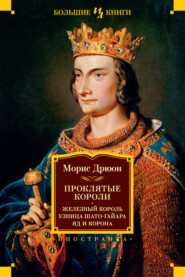По всем вопросам обращайтесь на: info@litportal.ru
(©) 2003-2025.
✖
The Poisoned Crown
Автор
Год написания книги
2019
Настройки чтения
Размер шрифта
Высота строк
Поля
The Poisoned Crown (#ue1049034-6207-5fa2-bddb-54a869c4d8ba)
Standing at one of the windows in the huge Castelnuovo, which had a view over the port and bay of Naples, the old Queen Mother, Marie of Hungary, watched a ship weighing anchor. Making sure that no one could see her, she wiped a tear from the corner of a lashless eyelid with a roughened finger.
‘Now I can die,’ she murmured ...
For her dearly loved Clémence, a princess of twenty-two without territorial inheritance, rich only in her reputation for beauty and virtue, she had recently obtained the most important of alliances, the most imposing of marriages. Clémence was leaving to become Queen of France. Thus she, who was the most deprived by fate of all the princesses of Anjou, who had waited the longest for a match, was now to receive the finest of kingdoms and to reign as suzerain over all her relations. It clearly illustrated the teaching of the Gospel.
Prologue (#ue1049034-6207-5fa2-bddb-54a869c4d8ba)
PHILIP THE FAIR HAD been dead six months. To the government of that remarkable monarch France owed the benefits of a long period of peace, the abandonment of disastrous overseas adventures, the organization of a powerful network of alliances and suzerainties, notable increases of territory by union rather than conquest, a definite economic expansion and a relative stability of currency, the non-interference of the Church in temporal affairs, the control of wealth and large private interests, the expression of the voice of the people in the councils of power, the security of the individual, and the organization of State administration.
His contemporaries were naturally not always very conscious of these ameliorations. Progress has never meant perfection. Some years were less prosperous than others, there were periods of crisis and revolution; the needs of the people were far from being satisfied. The Iron King had methods of making himself obeyed which were not to everyone’s taste; and he was more concerned with the grandeur of his Kingdom than with the individual happiness of his subjects.
Nevertheless, when he died, France was the foremost, wealthiest, and most powerful of all the nations of the western world.
It took his successors thirty years of perseverance to destroy his work, and, inordinate ambition alternating upon the throne with extreme incompetence, to open the country to invasion, deliver society over to anarchy, and reduce the population to the lowest condition of misery and despair.
In the long succession of vain imbeciles who, from Louis X, The Hutin, to Jean the Good inclusive, were to wear the crown, there was to be but one exception: Philippe V, the Long, second son of Philip the Fair, who returned to the methods and principles of his father – even though his passion for reigning led him to commit crimes and invent dynastic laws which led directly to the Hundred Years War.
The processes of decay were therefore to continue during a third of a century, but it must be admitted that a great part of the destruction was completed during the first six months.
Institutions were not sufficiently stable to be able to function without the personal intervention of the sovereign.
The feeble, nervous, and incompetent Louis X, overwhelmed from the very first day by the magnitude of his task, resigned the cares of power to his uncle, Charles of Valois, who was, it appears, a good soldier though a detestable politician, who spent his whole life searching for a throne and had now, at last, found an outlet for his turbulent blundering.
The middle-class ministers, who had been the backbone of the preceding reign, had been imprisoned, and the skeleton of the most remarkable of them all, Enguerrand de Marigny, once Rector-General of the Kingdom, was bleaching on the forks of the gibbet of Montfaucon.
Reaction was triumphant; the Barons’ Leagues were sowing disorder in the provinces and subverting the royal authority. The great Lords, Charles of Valois at their head, minted their own currency which they circulated throughout the country to their own personal profit. The Administration, no longer held in check, became corrupt, and the Treasury was empty.
A disastrous harvest, followed by an exceptionally hard winter, caused famine. The death-rate was rising.
During this time Louis X had been mainly preoccupied with repairing his domestic honour and endeavouring to efface, if it were possible, the scandal of the Tower of Nesle.
For lack of a Pope, whom the Conclave seemed unable to elect, and who was required for the purpose of pronouncing an annulment, the young King of France, so that he might remarry, had had his wife, Marguerite of Burgundy, strangled in the prison of Château-Gaillard.
Thus he became free to marry the beautiful Neapolitan Princess who had been found for him, and with whom he was making preparations to share the felicities of a long reign.
PART ONE (#ulink_7f3c0e3a-6e25-5eed-845d-5c32e3757c7d)
FRANCE AWAITS A QUEEN (#ulink_7f3c0e3a-6e25-5eed-845d-5c32e3757c7d)
1 (#ulink_da742ab2-d97c-5ed2-8a3e-8d4382b7640b)
Farewell to Naples (#ulink_da742ab2-d97c-5ed2-8a3e-8d4382b7640b)
STANDING AT ONE OF the windows in the huge Castelnuovo, which had a view over the port and bay of Naples, the old Queen Mother, Marie of Hungary, watched a ship weighing anchor. Making sure that no one could see her, she wiped a tear from the corner of a lashless eyelid with a roughened finger.
‘Now I can die,’ she murmured.
She had lived a full life. Daughter of a king, wife of a king, mother and grandmother of kings, she had settled one branch of her descendants upon the throne of central Italy, and obtained for the other, by war and intrigue, the Kingdom of Hungary, which she looked upon as her personal heritage. Her younger sons were princes or sovereign dukes. Two of her daughters were queens, one of Majorca, the other of Aragon. Her fecundity had been a means to power for the Anjou-Sicily family, a cadet branch of the Capet tree, which was now beginning to spread across all Europe, threatening to become as great as its trunk.
If Marie of Hungary had already lost six of her children she had at least the consolation of knowing that they had died as piously as she had brought them up; indeed, one of them, who had renounced his dynastic rights to enter the Church, was shortly to be canonized. As if the Kingdoms of this world were too narrow for this expanding family, the old Queen had dispatched her progeny to the Kingdom of Heaven. She was the mother of a Saint.
At over seventy she had but one duty left to fulfil and that was to assure the future of one of her granddaughters, Clémence, the orphan. This had now been achieved.
Because Clémence was the daughter of her eldest son, Charles Martel, for whom she had so persistently laid claim to the throne of Hungary, because the child had been orphaned at two years of age, because she herself had assumed entire responsibility for her education, and because finally this task was the last of her life, Marie of Hungary had held the girl in particular affection, in so far as a capacity for affection existed in that old heart, subordinated as it was to force, duty, and power.
The great ship, which was weighing anchor in the harbour upon this brilliantly sunny day of the first of June 1315, represented to the eyes of the Queen Mother of Naples both the triumph of her policy and the melancholy of things achieved.
For her dearly loved Clémence, a princess of twenty-two without territorial inheritance, rich only in her reputation for beauty and virtue, she had recently obtained the most important of alliances, the most imposing of marriages. Clémence was leaving to become Queen of France. Thus she, who was the most deprived by fate of all the princesses of Anjou, who had waited the longest for a match, was now to receive the finest of kingdoms and to reign as suzerain over all her relations. It clearly illustrated the teaching of the Gospel.
It was, of course, true that the young King of France, Louis X, was reputed to be neither particularly handsome of face nor pleasant of character.
‘But what does that matter? My husband, upon whom God have mercy, was excessively lame, but I succeeded, without much difficulty, in reconciling myself to the fact,’ thought Marie of Hungary. ‘Moreover, one does not become a queen in order to find happiness.’
People wondered, in covert whispers, that Queen Marguerite should have died in her prison so opportunely, just when King Louis, for the lack of a Pope, was unable to obtain an annulment of his marriage. But need one listen to scandal? Marie of Hungary was little inclined to waste pity upon a woman, particularly upon a Queen, who had betrayed her marriage vows and provided from such an exalted position so reprehensible an example. She saw nothing for surprise in the fact that God’s punishment should so naturally have fallen upon the scandalous Marguerite.
‘My beautiful Clémence will restore virtue to a place of honour in the Court of Paris,’ she told herself.
In a gesture of farewell she made the sign of the Cross upon the window with her grey hand; then, her crown resting upon her silver hair, her chin jerking with a tic, her walk stiff but still firm, she retired to her chapel to thank the Lord for having helped her to the accomplishment of her long royal mission and to offer up to God the deep unhappiness of all women who have come to the end of their earthly task.
In the meantime, the San Giovanni, the great ship with a round hull entirely painted in white and gold and flying from her mast and yards the pennants of Anjou, Hungary, and France, was beginning to tack away from the shore. The captain and his crew had sworn upon the Bible to defend their passengers against storm, Barbary pirates, and all the perils of the sea. The statue of Saint John the Baptist, the patron of the ship, shone in the sun upon the prow. In the fore- and after-castles, half as high as the masts, a hundred men-at-arms, look-outs, archers, and slingers were at their posts to repel the attacks of pirates. The holds were overflowing with provisions, and the sand of the ballast had been filled with amphorae containing oil, flagons of wine, and fresh eggs. The giant iron-bound chests, holding the silk robes, the jewels, the gold plate, and all the princess’s wedding presents, were stacked against the bulkhead of the saloon, a vast compartment between the mainmast and the poop where, among oriental carpets, the gentlemen and equerries were to be lodged.
The Neapolitans crowded upon the quays to watch the departure of what appeared to them a ship of good omen. Women held up their children at arms’ length. Through the loud murmur rising from the crowd were to be heard shouts, uttered with the noisy good nature with which the populace of Naples has always treated its idols:
‘Guardi com’ è bella!’
‘Addio, Donna Clemenza! Sia felice!’
‘Dio la benedica, nostra principessa!’
‘Non si dimentichi di noi!’
For Donna Clemenza personified a sort of legend to the Neapolitans. They remembered her father, the handsome Carlo Martelo, the friend of poets and in particular of the divine Dante, a learned prince, as good a musician as he was valiant in arms, who travelled the peninsula, followed by two hundred French, Provençal, and Italian gentlemen, all dressed, as he was himself, half in scarlet and half in green, their horses caparisoned in silver and gold. It was said of him that he was a true son of Venus, for he possessed ‘the five gifts that incite to love and which are health, beauty, wealth, leisure, and youth’. They had looked forward to his becoming king; but he had died of the plague at twenty-four and his wife, a princess of Hapsburg, had expired upon hearing the news, an event which had struck the popular imagination.
Naples had transferred its affection to Clémence who, as she grew up, had developed a likeness to her father. The royal orphan was adored in the poor quarters of the town to which she went to distribute charity; she was invariably affected by distress. Her face inspired the painters of the school of Giotto in their representations of the Virgin and the saints in their frescoes; and to this day travellers who visit the churches of Campania and Apulia may admire upon the walls of the sanctuaries the golden hair, the clear gentle eyes, the grace of the slightly curving neck, the long slender hands, without knowing that it is the portrait of the beautiful Clémence of Hungary.
Upon the crenellated deck which covered the after-castle, some thirty feet above the waves, the fiancée of the King of France gazed for the last time upon the land of her childhood, upon the old Castell’Ovo in which she had been born, upon Castelnuovo where she had grown up, upon the swarming crowd who threw her kisses, upon the whole lively, wonderful, dusty scene.
‘Thank you, Madam my Grandmother,’ she thought, her eyes raised to the window from which the figure of Marie of Hungary had just disappeared. ‘I shall doubtless never see you again. Thank you for all you have done for me. Having reached the age of twenty-two, I was in despair at not having yet found a husband; I thought that I should never find one and that I should have to enter a convent. It was you who were right to counsel patience. And now I am to be queen of that great kingdom which is watered by four rivers, and lapped by three seas. My cousin the King of England, my aunt of Majorca, my kinsman of Bohemia, my sister the Crown Princess of Vienna, and even my uncle Robert, who reigns here and whose subject I was till today, will become my vassals for the lands they have in France, or the links they have with that crown. But will it not be too heavy for me?’
She was experiencing at one and the same time joy and exaltation, fear of the unknown and that peculiar disquiet which comes upon the spirit at an irrevocable change of destiny, even when it surpasses every dream.
‘Your people are showing how much they love you, Madam,’ said a fat man standing beside her. ‘But I wager that the people of France will soon love you as much, and merely upon seeing you will welcome you as demonstratively as these are bidding you farewell.’
‘Oh, you will always be my friend, Messire de Bouville,’ Clémence replied warmly.
She felt the need of spreading her happiness around her and of thanking everyone.

















